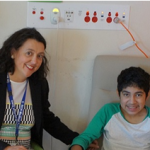RCH clinicians have worked with the Australian Pompe Association, drug company Genzyme and the Federal government to achieve government-subsidised treatment for late-onset Pompe disease.
12-year-old patient Christian Rivera received his first infusion at the RCH last week.
The federal government has listed the only registered treatment for Pompe disease, Myozyme (alglucosidase alfa), on the Life Saving Drugs Program (LSDP) for patients aged 2-18 years. Previously it was only available to children diagnosed in infancy.
Pompe disease is a rare, inherited and debilitating disease caused by a mutation in the gene that produces the enzyme responsible for breaking down glycogen in the body.
Christian was diagnosed with the disease when he was 11 years old, the first child diagnosed with juvenile (late-onset) Pompe disease in Australia. There are only two other known cases in Australia, although diagnosis is often delayed and there may well be other children with this condition who have not yet been diagnosed.
“Because this is a very expensive therapy and it is difficult to prove effectiveness of new treatments for conditions as rare as this, we had to work for quite some time with the Australian Pompe Association, Genzyme and the Federal government to obtain a framework for the responsible but timely provision of this medication,” Consultant Neurologist Associate Prof Monique Ryan said.
“Without treatment Christian would experience increasing muscle weakness, and he would likely become wheelchair dependent within five years,” Monique said. “He would then develop increasing weakness of the respiratory muscles, needing assistance from a ventilator when sleeping. His life expectancy might well be limited by this disease.”
The aim of treatment is to stop or slow progression of his muscle weakness, enabling him to function as well as possible for as long as possible.
“Promising new gene therapies are on the way for Pompe disease, and we hope that this treatment will buy us time for even better therapies to come along,” Monique added.
“Not knowing if this day would ever come has been a nightmare,” Christian’s mother Rina said. “But we are so happy that it finally is. Christian having guaranteed access to treatment for the rest of his life is something we will always be grateful for.”
The change in policy will be featured in The Age this week.

